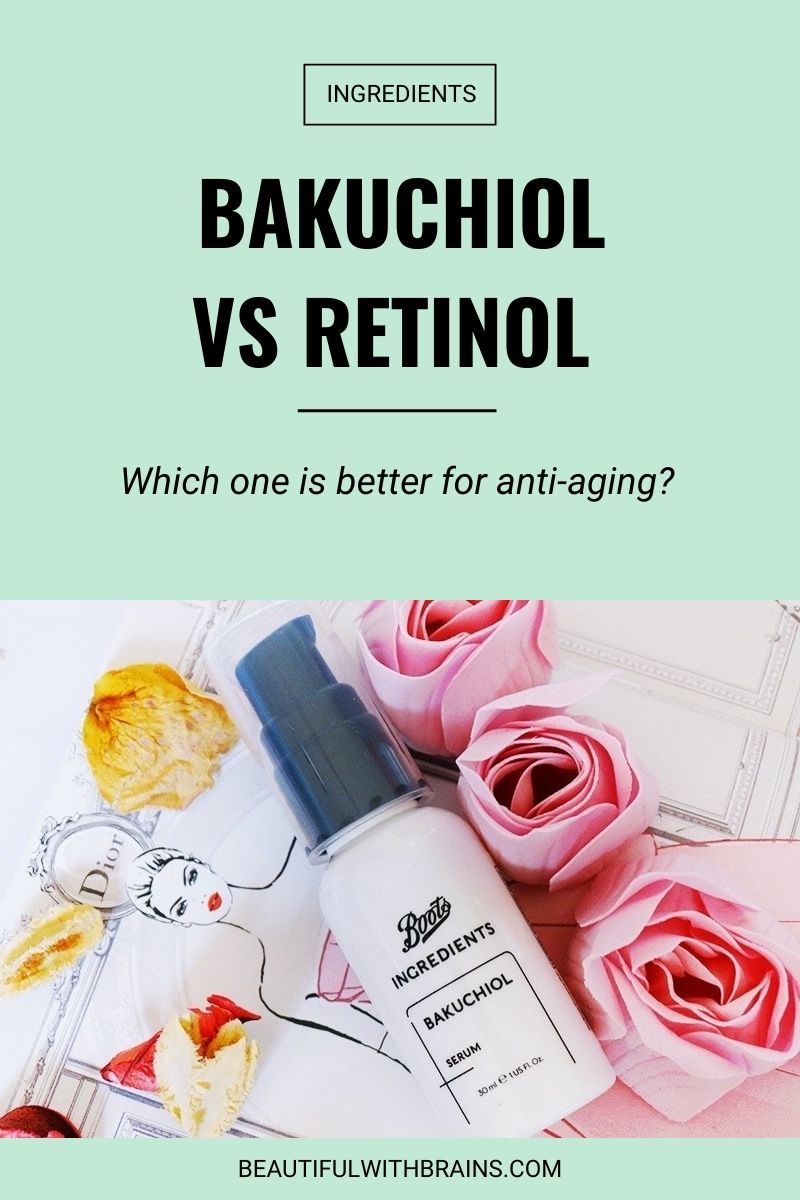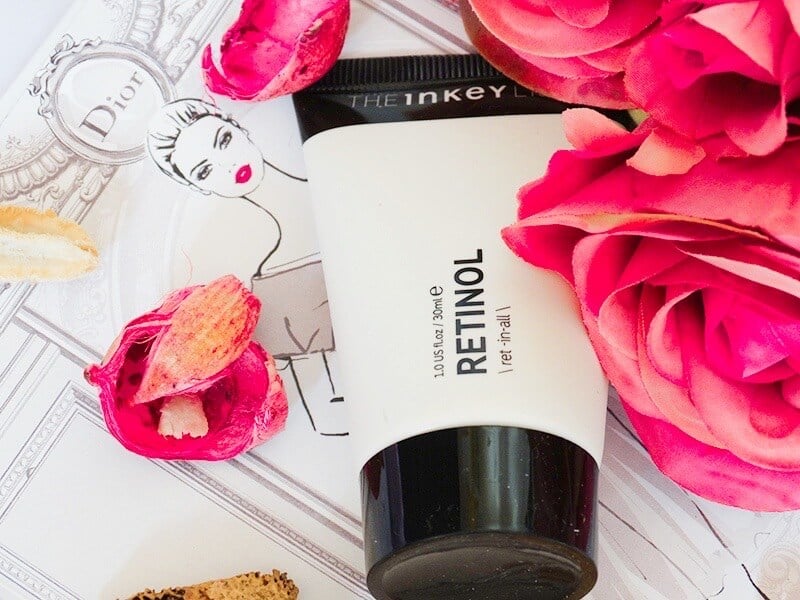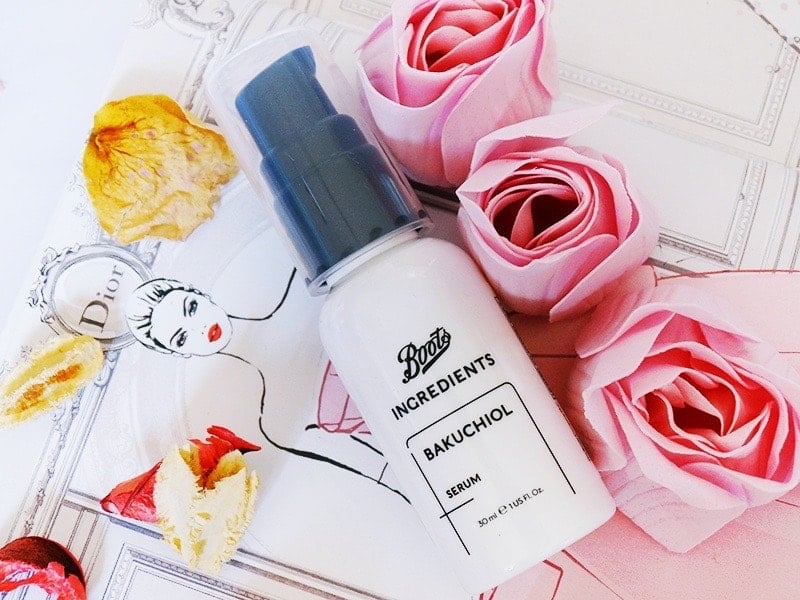
Bakuchiol VS retinol: which of the two is better at treating wrinkles? For decades, retinol (has been the gold standard for anti-aging. It reduces wrinkles, fades away dark spots, and even boosts collagen… But it’s irritating. And drying. And a total no-no during pregnancy (they cause birth defects in animals). If you can’t use retinol, are you doomed to wrinkles forever?
Thankfully, no. Meet Bakuchiol (pronounced buh-KOO-chee-all) Dubbed “the natural alternative to retinol”, it promises to do everything retinol does – without the nasty side effects. Beauty editors and influencers are already all over it, touting it as the next best thing in the skincare world.
Here at Beautiful with Brains, we’re more interested in what the science says. Has research proven Bakuchiol is a valid alternative to retinol for fighting wrinkles? Or is it all just marketing hype? Let’s find out:
- What Is Retinol And What Does It Do For Skin?
- What Is Bakuchiol?
- Bakuchiol Benefits: What Does It Do For Skin?
- Bakuchiol Vs Retinol: What Are The Side Effects?
- Who Should Use Bakuchiol?
- How To Use Bakuchiol
- Can You Mix Bakuchiol With Other Active Skincare Ingredients?
- What Are The Best Skincare Bakuchiol Serums & Oils?
- The Bottom Line
What Is Retinol And What Does It Do For Skin?
Before I tell you all about Bakuchiol, let’s find out more about retinol. Retinol is a form of Vitamin A. Other forms (called retinoids) are:
- Hydroxypinacolone Retinoate (Granactive Retinoid)
- Retinaldehyde
- Retinol
- Retinyl Palmitate
- Tretinoin (prescription-only)
Tretinoin is the most powerful (and harshest), so you need a prescription to get it. Retinol is the stronger OTC form of Vitamin A you can get – and the most common in skincare products. This article focuses on retinol, but everything I say about it applies to its retinoid siblings as well.
Retinol fights wrinkles in three ways: it boosts skin-firming collagen, neutralises free radicals, and speeds up the skin’s natural exfoliating process (by doing this, it also fades away dark spots and treats breakouts). Research shows that, in 12 weeks, retinol improves the texture and tone of your skin, so that your skin looks smoother, your wrinkles smaller, and your dark spots are fading away.
Of course, it takes longer than 12 weeks to get rid of wrinkles and dark spots completely. But being able to make a dent in them within that time frame is very impressive. No wonder it’s considered the gold standard for anti-aging.
What Is Bakuchiol?
Rival Bakuchiol is an antioxidant derived from the leaves and seeds of babchi (Psoralea corylifolia) plant, native to India. It’s been used for centuries in Ayurvedic medicine and it’s now making its debut in skincare products, too.
Bakuchiol helps prevent fine lines and wrinkles, increase elasticity, and fade away dark spots. “It works through the same receptors that retinol uses, which is why many refer to it as a natural retinol alternative,” says Dr. Joshua Zeichner, director of cosmetic and clinical research in dermatology at Mount Sinai Hospital.
Related: What Form Of Retinoid Is Right For You?
Struggling to put together an anti-aging skincare routine that fights wrinkles and gives your skin a youthful glow? Download your FREE “Best Anti-Aging Skincare Routine” cheat sheet below to get started (it includes product recommendations + right order application):
Bakuchiol Benefits: What Does It Do For Skin?
Bakuchiol is said to deliver the same benefits as retinol, minus the irritation. “Studies have shown that bakuchiol helps prevent fine lines and wrinkles, and helps with pigmentation, elasticity, and firmness,” shares Dr. Debra Jaliman, assistant professor in the department of dermatology at the Icahn School of Medicine at Mount Sinai. Let’s take a closer look at these benefits, shall we?
Bakuchiol VS Retinol: Which Is Better For Wrinkles?
I lost count of how many plant extracts promise to give you the same benefits as retinol – and don’t deliver. Bakuchiol seems to be the exception to the rule. A 2018 study published in the British Journal Of Dermatology shows that Bakuchiol has some powerful anti-aging properties.
Researchers asked 44 people to apply either a 0.5% Bakuchiol cream twice a day or a 5% retinol cream once a day on their faces for 12 weeks. They then used a mix of computer analysis and dermatologist’s grading to measure the results. Both Bakuchiol and retinol reduced wrinkle surface area and hyperpigmentation. Impressive, isn’t it?
Until you realise retinol does all this when used ONCE a day, while Bakuchiol requires TWO applications a day. Not quite the powerful natural alternative it’s made out to be, is it? Still, if there are no side effects, a double application is worth it, right?
People who used retinol DID experience more peeling and stinging. But Bakuchiol wasn’t entirely without side effects. It caused more redness than retinol!
Related: Retinol Side Effects And How To Deal With Them
Bakuchiol VS Retinol: How Do They Work?
Bakuchiol and retinol give you similar results. Does that mean they work the same? Yes and no. Both Bakuchiol and retinol produce similar gene expression in the skin that can improve photodamage and boost collagen production.
But, there are differences, too:
- Retinoic Acid works through specific receptors that trigger your skin cells to produce collagen Types I, III and IV. In English, it means it makes skin firmer and more elastic while decreasing wrinkles. Bakuchiol doesn’t resemble Retinoic Acid, so it can’t fit into the same receptors. Yet, it still stimulates them, leading to similar results.
- Bakuchiol is better than retinol at slowing down the activity of two matrix metalloprotease enzymes (MMP-1 and MMP-12) that break down collagen and elastin (the proteins that keep skin firm and elastic).
What does all this sciencey jargon mean? Bakuchiol and retinol gives you similar results using different methods. Which one is better? We don’t know yet.
Related: 8 Proven Ways To Make The Most Of Retinol (Even If You Have Sensitive Skin)

Does Bakuchiol Help With Acne?
By speeding up cellular turnover, retinol helps to treat acne and keep breakouts at bay. Can bakuchiol do the same? A 2021 study published in the Journal of Drugs in Dermatology investigated the anti-acne properties of bakuchiol. 13 patients with mild to moderate acne applied a product with 0.5% Bakuchiol twice a day for 12 weeks.
The results? The bakuchiol cream “significantly reduced the number of inflammatory lesions and improved existing PIH [post-inflammatory hyperpigmentation, i.e. the dark spots left behind by pimples].” The researchers further state that this treatment “improves mild to moderate acne and may be particularly well suited for individuals with skin of color.”
A 2015 study published in Clinical, Cosmetic and Investigational Dermatology Journal shows that bakuchiol, when used with topical retinoid Adapalene, helps to reduce inflammatory lesions better than if you used each of them alone. While I don’t recommend bakuchiol alone to treat acne, it can be a powerful ally in your anti-acne routine.
Bakuchiol VS Retinol: Is Bakuchiol Effective And Better Than Retinol?
Bakuchiol gives you similar results as retinol, but you CAN’T compare the two. For starters, retinol must be converted into Retinoic Acid (Tretinoin) for it to work its magic. That’s what really reduces those pesky wrinkles and fades away dark spots. There’s a ton of research, over more than two decades, that proves Retinoic Acid works. But we have very little proof that Bakuchiol is an anti-aging powerhouse.
No matter how impressive, one study is still one study. I need way more than that to convince me to make the switch. Plus, the fact that marketers are comparing Bakuchiol to the weaker retinol rather than the all-powerful Retinoic Acid – and even then it takes a double dose to achieve the same results – makes me think Bakuchiol isn’t as powerful as they’re making it out to be.
If we had several studies showing Bakuchiol works as well – if not better! – than Tretnoin, then I’d be impressed enough to switch. Just saying.
FYI: Bakuchiol seems to be a valid alternative to retinol, for people who can’t tolerate the latter. BUT, it’s NO match for Tretinoin, the prescription form of Vitamin A (the same family retinol belongs to). If you’re using Tretinoin, switching to Bakuchiol would be a HUGE step back.
Related: The Beginner’s Guide To Tretinoin: How To Get Started And Avoid Peelings And Irritation
Bakuchiol Vs Retinol: What Are The Side Effects?
Retinol is powerful, but harsh. It usually requires an adjustment period during which your skin learns to tolerate it. During this adjustment period, you can experience dryness, redness, peeling, and evening burning. For this reason, I recommend you start with a small concentration twice a week and increase both dose and frequency gradually.
Bakuchiol is gentler and better tolerated than retinol, but it is NOT without side effects. It can still cause irritation and redness. If you have sensitive skin, do a patch test first.
Can Bakuchiol Cause Purging?
Yes, bakuchiol can cause purging. Even though they look the same (red, angry pimples), a purge is different from a breakout.
A breakout happens when your skin produces excess oil. This excess gets stuck in your pores, where it mixed with dead cells and bacteria, and causes breakouts. A breakout can also be caused by comedogenic ingredients that get stuck in the pores and contribute to clogging them up. A breakout lasts as long as the cause is left untreated.
A purge happens when you exfoliate skin (bakuchiol speeds up the skin’s natural exfoliating process). By removing dead skin cells, you bring to the surface the pimples that were lying underneath. A purge lasts from 4 to 6 weeks, after which you get your clear skin back. Both bakuchiol and retinol can cause purging.
Is Bakuchiol Safe During Pregnancy?
Retinol (and all other retinoids) are a no-no during pregnancy. Animal studies show that it can cause birth defects in mice. Granted, we’re not mice, but as we can’t do studies on humans for obvious reasons, skincare experts recommend you avoid retinoids during pregnancy and breastfeeding.
Bakuchiol is said to be a safe alternative to retinol during pregnancy. On the one hand, it’s been used for centuries in Eastern medicine and I’m not aware of severe side effects. On the other hand, there are no studies (again, for obvious reasons!) that prove it’s safe either. It’s up to you to decide what’s best for you and your baby.

Who Should Use Bakuchiol?
If your skin can take retinol (or another retinoid), stick to that. It’s still the most effective anti-thing ingredient you can get OTC. I’m not the only one who thinks so.
“There’s not a lot of data with [bakuchiol] as of yet and it could be promising,” says dermatologist Dr. Purvisha Patel. “Retinol, however, is a tried-and-true ingredient that delivers what it promises in the concentrations [in which] it’s given. So, for now, retinol is [still] the gold standard for a safe, effective ingredient in skin care that helps reduce fine lines and wrinkles.”
You should switch to Bakuchiol only if:
- You’re pregnant/breastfeeding: Unlike retinoids, Bakuchiol is safe both for mom and baby during these precious months.
- You have sensitive skin that can’t tolerate retinoids at all: Bakuchiol may not be as powerful as retinol, but it can still help you fight premature aging without trigging a flare-up.
Related: What Skincare Ingredients Should You Avoid During Pregnancy?
How To Use Bakuchiol
Unlike retinol, Bakuchiol doesn’t degrade or make skin more prone to sun damage when exposed to sunlight. This means you can use Bakuchiol morning and night. In fact, twice daily application will give you the best results, if you’re using it as an alternative to retinol. If your Bakuchiol comes in a serum, apply that straight after cleansing and/or exfoliation. If it comes in an oil, it goes right before sunscreen during the day and it’s the last step of your skincare routine at night.
Can You Mix Bakuchiol With Other Active Skincare Ingredients?
Retinol is a powerful ingredient that’s better tolerated when used alone. I always recommend to alternate it with exfoliants, like AHAs and BHA, at night and use Vitamin C in the morning. That way, you get all the benefits from the best anti-aging actives with a lower risk of irritations.
Bakuchiol is much gentler, so you can use it together with AHAs, vitamin C, and even retinol itself. So far, research hasn’t shown any issues in using Bakuchiol with other powerful actives.
What Are The Best Skincare Bakuchiol Serums & Oils?
Fun fact! Bakuchiol seems to keep being packaged in purple face oils because the babchi flower is purple. But we can assure you the ingredient itself is most definitely not purple. It’s a dull yellow.
- Paula’s Choice Clinical 0.3% Retinol + 2% Bakuchiol Treatment ($62.00): Want to use both retinol and Bakuchiol? This serum has both, plus its fair share of antioxidants to both treat wrinkles and prevent new ones from forming. Available at Cult Beauty, Dermstore, Paula’s Choice, Selfridges, SpaceNK
- The Inkey List Bakuchiol Moisturiser ($12.99): Bakuchiol comes in a moisturising to make skin softer and smoother while fighting wrinkles. It’s more suitable for dry than oily skin. Available at Cult Beauty, Look Fantastic, Sephora, and The Inkey List
- Versed Skincare Press Restart Gentle Retinol Serum ($21.99): A serum with both bakuchiol (0.5%) and retinol (0.3%) in a moisturising sunflower oil base. It moisturises skin, fights wrinkles, and makes skin smoother and brighter. Available at Boots, Cult Beauty, Revolve, and Versed
- Good Molecules Bakuchiol Oil Blend For Oily Skin ($10.00): Most bakuchiol products come in an oil base that could clog pores and aggravate acne in oily skin. This serum uses two lightweight oils, baobab and rosehip that shouldn’t cause any issues. Rosehip has been shown to treat acne, too! Available at Ulta.
- Acure Radically Rejuvenating Bakuchiol Overnight Treatment ($24.99): I wouldn’t call it radically rejuvenating, but it contains enough bakuchiol to fight wrinkles, antioxidants to prevent them, and natural oils and butters to moisturise skin and plump up fine lines. Available at iHerb and Ulta.
The Bottom Line
Bakuchiol is a promising ingredient, but it’s not the miracle alternative to retinol it’s touted to be. Unless you’re pregnant or have super sensitive skin, stick to the tried and tested retinol for now. Or use them together.

